-
The Cadets (1) aka The Jacks
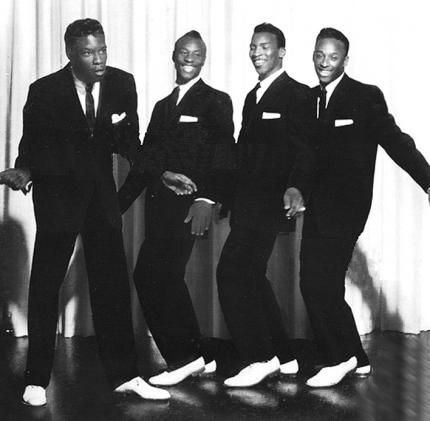
The Cadets (1) aka The Jacks (Los Angeles)
(By Hans-Joachim)
Members:
Willie Davis (First Tenor)
Austin “Ted” Taylor (First Tenor)
Aaron Collins (Second Tenor)
Glendon Kingsby (Baritone)
Will “Dub“ Jones (Bass)
Discography:
The Cadets (1)
1955 - Don't Be Angry / I Cry (Modern 956)
1955 - Rollin' Stone / Fine Lookin' Baby (Modern 960)
1955 - I Cry / Fine Lookin' Baby (Modern 963)
1955 - Annie Met Henry / So Will I (Modern 969)
1955 - Do You Wanna Rock? / If It Is Wrong (Modern 971)
1956 - Heartbreak Hotel / Church Bells May Ring (Modern 985)
1956 - Stranded In The Jungle / I Want You (Modern 994)
1956 - I Got Loaded / Dancin' Dan (Modern 1000)
1956 - I'll Be Spinning / Fools Rush In (Modern 1006)
1956 - Love Bandit / Heaven Help Me (Modern 1012)
n/a - Let's Rock And Roll (unreleased)
n/a - Away (unreleased)
n/a - Memories Of You (unreleased)
Young Jessie (bb the Cadets)
1955 - Mary Lou/Don't Think I Will (Modern 961)
Albums
1957 - Why Don't You Write Me** / Oo Wee Baby* / Let's Make Up** / Dream A Little Longer** / This Empty Heart** / So Wrong** / /Wiggle Waggie Woo* / You Belong To Me* / Sugar Baby** / Why Did I Fall In Love** / Do You Wanna Rock* / My Clumsy Heart** (RPM LP 3006 / Crown LP 5021)
1963 - Stranded In The Jungle / Annie Met Henry / Marie My Love*** / The Riddle*** / John Henry*** / Love Bandit / Rollin' Stone / Heaven Help Me / I Had But 50 Cents*** / Rum Jamaica Rum*** (Crown LP 5370)
1963 - So Wrong / You Are The First One**** / My Love Has Gone / Be Loves Dovey**** / Why Don’t You Write Me / Hey Little Girl* / Away (prev. unrel.), Fine Lookin’ Woman* / Dream A Little Longer (Crown LP 5372)
*Cadets, ** Jacks, *** Aaron Collins with studio group, ****Rockets
Biography:
The Los Angeles-based Jacks were so good at covering popular hits of the day that their versions were often equal to (if not better than) the original versions. They were versatile in R&B, jump tunes, ballads, calypso songs, and recorded some of the greatest early rock & roll songs ever, including "Stranded in the Jungle" (released in June of 1956, and charting at number four R&B/number 15 pop). Mostly, though, the Jacks are remembered for recording under two names simultaneously: as the Jacks (for Modern) and the Cadets (for RPM). Each group had its own hits and each with a slightly different sound and musical direction.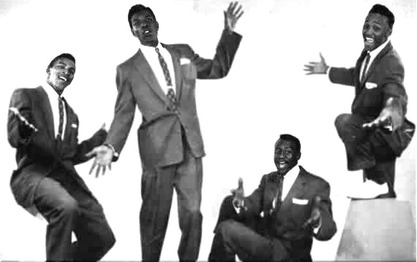
The Jacks/Cadets began as a gospel group during the late '40s in Los Angeles, under the guidance of former Dixie Hummingbirds' baritone Lloyd McGraw. In 1954, McGraw joined up with first tenor Austin "Ted" Taylor, lead and second tenor Aaron Collins (brother of Betty and Rosie Collins, who recorded as the Teen Queens), tenor Willie Davis, and Will "Dub" Jones (lead and bass), who possessed a stratospheric falsetto. The band on most of the group's sessions was lead by tenor saxophonist Maxwell Davis.
It was Modern's Joe Bihari who came up with the idea of having one group with a split personality, envisioning the Jacks as a ballad harmony group utilizing the writing talents of Aaron Collins and the Cadets as an up-tempo and novelty song quintet who mostly covered other acts' material. As a rule, either Dub Jones or Aaron Collins sang lead on the Cadets recordings, while tenor Willie Davis fronted the Jacks.
In late 1954, the quintet - as the Cadets - recorded a version of Nappy Brown's "Don't Be Angry" and a calypso-flavored cover of "Rolling Stone," which outsold the original by Excello's Marigolds. Later, the Cadets issued their third single, "I Cried," backed up singer Dolly Cooper on "My Man," Young Jessie on "Mary Lou," and Richard Berry on "Jelly Roll" and "God Gave Me You."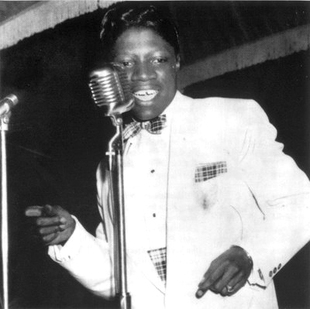
Young JessieBy the summer of 1955, the Cadets had released "Annie Met Henry," a single that fell in line with the whole "Annie" craze created in the aftermath of Hank Ballard & the Midnighters' big hit "Work With Me Annie," which had been released some 16 months earlier and was still going strong. The public was quickly tiring of the whole "Annie" phenom, however, so DJs flipped over the 45 and gave the B-side, "So Will I," the push instead.
The Cadets' next Modern release was "Do You Wanna Rock," an exciting up-tempo revision of the Drifters' big R&B hit (number two) "Whatcha Gonna Do." The song also had a big impact on Hank Ballard and provided the format for Chubby Checker's "The Twist." It was the Cadets' next single, the buoyant "How Soon," that scored the regional airplay and sales.
In early 1956, Prentice Moreland replaced Ted Taylor (although he only recorded with the group on three early songs, he didn't usually perform with them), who had left the group for a solo career as a solo blues vocalist. By February, the Cadets had moved on to new cover material, including Elvis Presley's "Heartbreak Hotel" and the Willows' "Church Bells May Ring." Around this time, Aaron Collins brought his two little sisters, Rosie and Betty, to Joe Bihari with an original song called "Eddie My Love." By the spring, the Teen Queens had the number two R&B record in America with "Eddie," which also charted number 14 on the pop chart.One day, Bihari and arranger Maxwell Davis handed the group a beautiful ballad titled "Why Don't You Write Me?," the original of which - by the Feathers - was soon to be issued on the Showtime label. They quickly did a cover; the Feathers' original came out in the fourth week of April 1955 and the Jacks' copy came out one week later (on the Modern affiliate RPM). The flipside, Charlie Calhoun's "Smack Dab in the Middle," was actually cut as being by the Cadets and wound up on their first LP. Even though it was recorded by the same group, it was listed as being by the Cadets in keeping with the "two groups in one" philosophy.
The Jacks' "Why Don't You Write Me?" hit the R&B charts on August 6th, and jumped up to number three R&B by September; it even managed to cross over to the pop charts to reach number 82, charting before the Cadets charted with their outlandish cover of "Stranded in the Jungle."
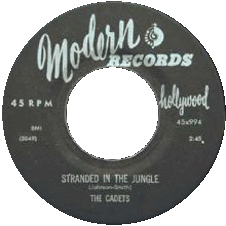
When the ballad side began to break big in the pop field, Bihari immediately bumped the B-side and a second pressing was hastily issued with a ballad on the flipside, "My Darling."
The instant that Bihari heard the Jay Hawks' "Stranded in the Jungle," a rough and ragged original that had been waxed first, then heard the version done by his own act, the Cadets, while in the studio, he knew that his group's was far superior. He quickly pressed up copies and got them to radio stations in strong regional markets across the country and into stores in those areas, before the Jay Hawks' even had a chance to make a move themselves. Released in June of 1956, the song shot up the charts, to number four R&B/number 15 pop.
What would prove to be Prentice Moreland's only Cadets/Jacks recording session provided the group with a catch phrase of their own; he delivered the line "Great googly-moogly, let me outta here," on "Stranded in the Jungle." It was a line he had picked up from a Cincinnati DJ.
Modern tried to forced Moreland to remain with the group instead of leaving for his own solo career, but Moreland quit anyway and was replaced by former Flairs baritone Thomas "Pete" Fox. Moreland later sang with the Colts and went on to become a single artist for various labels, recording for Edsel in 1959, Del-Fi Records' subsidiary Donna in 1960, and Challenge in 1962. Lloyd McCraw also left the group around this time.
Subsequent Jacks/Cadets sides from 1956 failed to generate interest or sales for Modern, however. The Jacks tried again with a few original ballads and eventually hit with "Love Bandit," their last record of 1956, which was cut from the same cloth as "Stranded in the Jungle" and name-checked many of the outlaws and sheriffs of the Old West ("Frank James, Jesse James, and Billy the Kid....").
The Jacks never again achieved the measure of success that "Stranded" had achieved. In September of 1956, they tried again as the Cadets for "Dancin' Dan," a slightly altered version of the Dominoes big hit "Sixty-Minute Man," which featured "Dub" Jones on lead vocals. After that, they covered "Johnnie" (Johnnie Louise Richardson, later a member of the Jaynettes, of "Sally Go Round the Roses" fame) and "Joe"'s (Joe Rivers) "I'll Be Spinning," a number ten hit on the East Coast (number one in NY), distributed by Chess Records. The Cadets' quickly recorded cover version of "I'll Be Spinning" outsold the original, however, on the West Coast.
In February 1957, Modern issued Rockin' and Reelin', the Cadets' first LP, one of the very first R&B group LPs, which collected most of their previously released A and B-sides. In March, eight months after their last release and 22 months after the release of their only hit, RPM put out the Jacks' Jumpin' With the Jacks LP, which contained ten sides of which three ("You Belong To Me," "Do You Wanna Rock," and "Wiggie Waggie Woo") were released on singles by the Cadets. Another single called "Pretty Evey" was thought to be a Cadets release, and even listed incorrectly as such when it was issued in May 1957, but was actually Aaron singing lead with another obscure house group.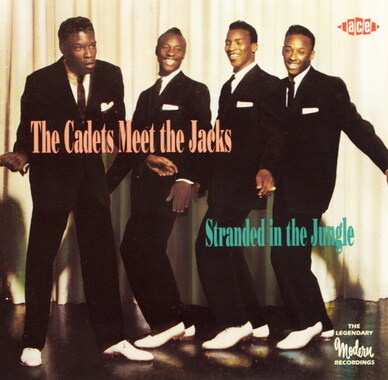
By this time, Bihari and Modern had given up on the Jacks part of the equation and from that point on, the group was exclusively known as the Cadets. Their last RPM single was "Ring Chimes," issued in December 1957. By the turn of the new decade, the Cadets had been ready to call it a career.
Will "Dub" Jones later became the main bass man for the mega-popular group the Coasters. Davis and Collins soon re-formed the Cadets, this time adding Thomas Miller (baritone) and George Hollis (bass), both previously of the Flares. The new Cadets signed with the Felsted label, a New York-based label headed by Walt McGuire. After two singles in 1960, they were ready to call it a career, but in name only; Randolph Jones later joined the group, substituting for Hollis on bass, and the quartet became the Peppers. They released one single, "One More Chance," on Ensign in 1961.
That year, with Hollis back on bass, the group became the Flares (different spelling this time) on Felsted. Their third single for the label, the energetic dance record "Foot Stomping, Pt. 1," went to number 25 on the pop Charts (number 20 R&B). The group then signed to Press Records for seven more singles, all of which went nowhere. A year later (in 1962), Davis and ex-Cadet McCraw teamed to form the Thorables (Titanic Records); in total, there were six more recordings by the Flares and none went anywhere. 1964 and the British Invasion pretty much brought the end of the road for the Jacks/Cadets/Flares at this point.
In the early '80s, Aaron Collins wrote songs for John Water's Hairspray. Ted Taylor died in 1987, Lloyd McCraw in 1987, Prentice Moreland in 1988, Aaron Collins in 1997, and Dub Jones in 2000.
Bryan Tomas, All Music Guide
http://home.att.net/~uncamarvy/JacksCadets/jackscadets.html
http://home.earthlink.net/~jaymar41/jacks_cadets.html
CD :
MP3 :
-
Comments
2Doctor bopThursday 6th June 2019 at 19:11Les jaynetts de Sally go round thé rose sont un groupe de Philadelphie.les jaynells do t a fait partie sont un des noms utilisé par les hearts dans diverses moutures pour les labels j&s et si ce
 Suivre le flux RSS des commentaires
Suivre le flux RSS des commentaires
 Add comment
Add comment
Doo Wop - Rhythm & Blues - Mail : jcpiazza26@gmail.com


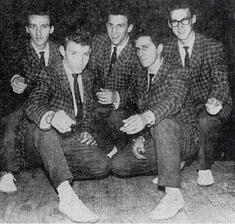
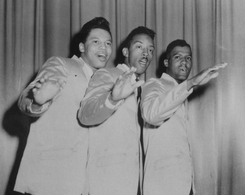

My comments here are NOT exclusively for this site, which I THINK IS GREAT by the way, but are also inteneded for many other site's and cd or record liner notes, and such elsewhere. However, the "biography" & song list for the Cadets confirms more of what I've mentioned here before. "Covering" has always been a part of the music scene, only, in the 1930's & 1940's it wasn't looked upon negatively or called "covering". Just as The Diamonds had done, here we see another black group, like The Charms, who did their own version of other artists material. However, I don't hear a negative sounding tone to their biography in regards to "covering", while I do in the biography for The Diamonds. Differnce is that The Diamonds were a "white" group? Why the differnce in biography tone though? Covering is still covering, but it appears that it's only a "bad thing" when a "white" group or artist does it. Note: "Silhouettes" by The Rays was covered by both Steve Gibson & The Red Caps & Frankie Lymon ,both black, however the actual song was written by a white composer/singer. Where's the negative "covering" comments. Didn't a mock black group called The Shields cover the Slades, a white group, 1958 "You Cheated" or didn't The Cufflinks, a black group, also cover The Casuals,another white group, "So Tough"? Again, I personally like this site. I'm not saying anything bad about it, personally I'm glad this site is on the web; it's great for the groups & it's great for the music that they created. Elsewhere, over the years, I've read too many unfair comments about both The Diamonds & The Crewcuts in regards to "covering" and I'm merely pointing out that it was done by many others as well. Keep it fair & just enjoy the music.